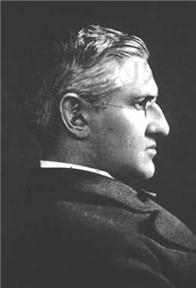Not that I speak in respect of want: for I have learned, in whatsoever state I am, therewith to be content. Philippians 4:11
When peace like a river attendeth my way,
When sorrows like sea billows roll;
Whatever my lot, Thou hast taught me to say,
It is well, it is well with my soul.
"It Is Well with My Soul" is one of the most well-known and well-loved songs found in our hymnals. Its beautiful lyrics have served to comfort more people than we could ever dream of counting. However, this beautiful composition sprang up from the darkest times in the life of its author.
The hymn was written in 1873 by an American lawyer, Horatio Spafford. Spafford lived in Chicago, and invested heavily in real estate on the north side of the city. When the Great Fire of Chicago swept through the city in 1871, much of his investment literally went up in smoke. His troubles deepened when he suffered sever losses during the Panic of 1873, then known as the Great Depression.
Following those disasters, Spafford decided that it was in his and his family's best interests to go to Europe for a holiday. He selected England as the location for the vacation because evangelist D. L. Moody, with whom Spafford and his wife Anna were good friends, was scheduled to preach there in the fall of 1873. On the day of their planned departure, Spafford was detained by business affairs related to the Great Fire, and was forced to send his wife and four daughters ahead with the intentions of catching up to them later. Little did he know, he would never see his daughters again.
Mrs. Spafford and her daughters boarded the French steamship, the SS Ville du Havre, on November 15. A week into the journey, at about 2 AM on the 22nd, the steamer collided with a Scottish Clipper, the Loch Earn. The force of the impact was nearly powerful enough to tear the French ship in two. Panicked passengers that raced to the deck of the ship were assured that the situation wasn't serious, but the ship was sinking so fast that the truth couldn't be concealed. The captain of the Loch Earn -- which was damaged severely enough that it was eventually abandoned itself -- did everything he could to rescue the passengers and crew of the Ville du Havre, but there was little time. The ship sank in less than 12 minutes, only giving the crew of the Loch Earn enough time to save 61 passengers and 26 crew. Two hundred twenty-six souls on board the Ville du Havre drowned.
Anna Spafford was among the 87 rescued, but 11-year-old Tonetta, nine-year-old Bessie, five-year-old Margaret Lee, and two-year-old Annie all drowned. Upon her arrival in England, a heartbroken Anna Spafford sent a now famous telegram to her husband that read simply, "Saved alone...."
Upon receiving word of the disaster, Spafford went to England to join his grieving wife. The work for which he is now most famous was inspired as his ship passed near the spot that his four children lost their lives. In a moment during which "sorrows like sea billows rolled" over his spirit, the all-sufficient grace of God brought about a reminder that comforted not only not only its author but many since.
Even in the times of deepest sorrow, all that we face falls within the will of God. Nothing that comes into the life of a child of His without His approval, and nothing will meet approval unless it is for the good of His children Whether in wealth or want, sorrow or solace, we can be content because we are in His hand. No matter what we go through, it can be well with our souls.

No comments:
Post a Comment